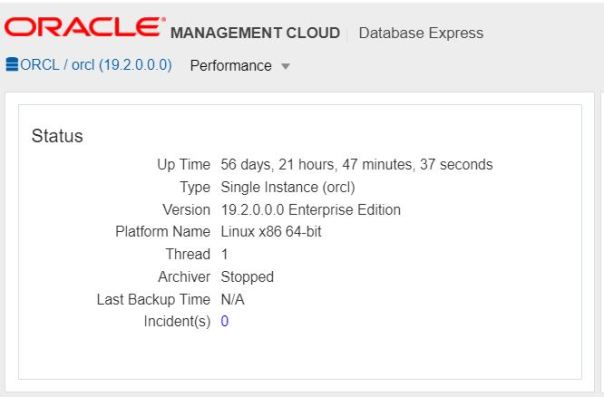Automatic Indexing (AI) is probably the most important new feature of Oracle Database 19c and AI is arguably one of the best example of AI in the IT industry. But there is much more that came along with 19c.
Here is my choice of the top 10 least known (for now at least) new features of Oracle Database 19.2 (in no order whatsoever):
1. Security: if the database password file name or location has been changed and the metadata cache needs to be refreshed with the details of the updated database password file, you can do it simply with the following command:
SQL> alter system flush passwordfile_metadata_cache; System altered.
In 19c, most of the Oracle Database supplied schema-only accounts now have their passwords removed to prevent users from authenticating to these accounts. But DBAs can still assign passwords to the default schema-only accounts.
2. SQL: the LISTAGG aggregate function now supports duplicate elimination by using the new DISTINCT keyword.
There are also a new bitvector SQL operators can be used to speed up COUNT DISTINCT operations within a SQL query.
3. Active Data Guard DML redirection: You can now run DML on the Active Data Guard standby database. When run on the standby side, the update is passed to the Primary database where it is executed and the resulting redo of the transaction will update the standby after which control will be returned to the application.
4. There are 6 new init.ora parameters in 19c. DBAs can now tune in DataGuard the amount of wait time by using DATA_GUARD_MAX_IO_TIME and DATA_GUARD_MAX_LONGIO_TIME. You can check details for all six:
ADG_REDIRECT_DML
DATA_GUARD_MAX_IO_TIME
DATA_GUARD_MAX_LONGIO_TIME
ENABLE_IMC_WITH_MIRA
LOB_SIGNATURE_ENABLE
MAX_DATAPUMP_PARALLEL_PER_JOB
5. You can now create Materialized Views containing bitmap-based COUNT(DISTINCT) functions. This means that the MVs are based on SQL aggregate functions that use bitmap representation to express the computation of COUNT(DISTINCT) operations.
SQL> create materialized view MV_SALES as select CLIENT, BITMAP_CONSTRUCT_AGG(BITMAP_BIT_POSITION(PRICE),'RAW') bm_price from SALES group by CLIENT,BITMAP_BUCKET_NUMBER(PRICE); Materialized view created.
6. Looks like there is now automatic resolution of SQL plan regressions: “SQL plan management searches for SQL statements in the Automatic Workload Repository (AWR). Prioritizing by highest load, it looks for alternative plans in all available sources, adding better-performing plans to the SQL plan baseline. Oracle Database also provides a plan comparison facility and improved hint reporting.”
7. Real-Time Statistics is also a new cool feature. “Oracle automatically gathers online statistics during conventional DML operations. Statistics can go stale between execution of DBMS_STATS statistics gathering jobs. By gathering some statistics automatically during DML operations, the database augments the statistics gathered by DBMS_STATS. Fresh statistics enable the optimizer to produce more optimal plans.”
8. Hybrid Partitioned Tables: now large portions of a table can reside in external partitions, for example in the Oracle Cloud. With this new feature, you can also easily move non-active partitions to external files, such as Oracle Data Pump files, for a cheaper storage solution. Hybrid partitioned tables support all existing external table types for external partitions: ORACLE_DATAPUMP, ORACLE_LOADER, ORACLE_HDFS, ORACLE_HIVE.
9. Data Pump:
– Oracle Data Pump allows tablespaces to stay read-only during TTS import.
– Oracle Data Pump can work in test mode for transportable tablespaces.
– Oracle Data Pump supports resource usage limitations with the introduction of two new parameters: MAX_DATAPUMP_JOBS_PER_PDB and MAX_DATAPUMP_PARALLEL_PER_JOB.
– Data Pump no longer enables secure, password-protected roles by default. Beginning with 19c, you must explicitly enable password-protected roles for an individual export or import job. A new command-line parameter has been added, ENABLE_SECURE_ROLES=YES | NO that can be used to explicitly enable or disable these types of roles for an individual export or import job.
– The new Data Pump command-line parameter CREDENTIAL enables secure import into a managed service from dump files in the Oracle Object Store Service.
10. SQL Quarantine: “SQL statements that are terminated by Oracle Database Resource Manager due to their excessive consumption of CPU and I/O resources can be automatically quarantined. The execution plans associated with the terminated SQL statements are quarantined to prevent them from being executed again.”
Check out the new Oracle package DBMS_SQLQ – cool stuff!

